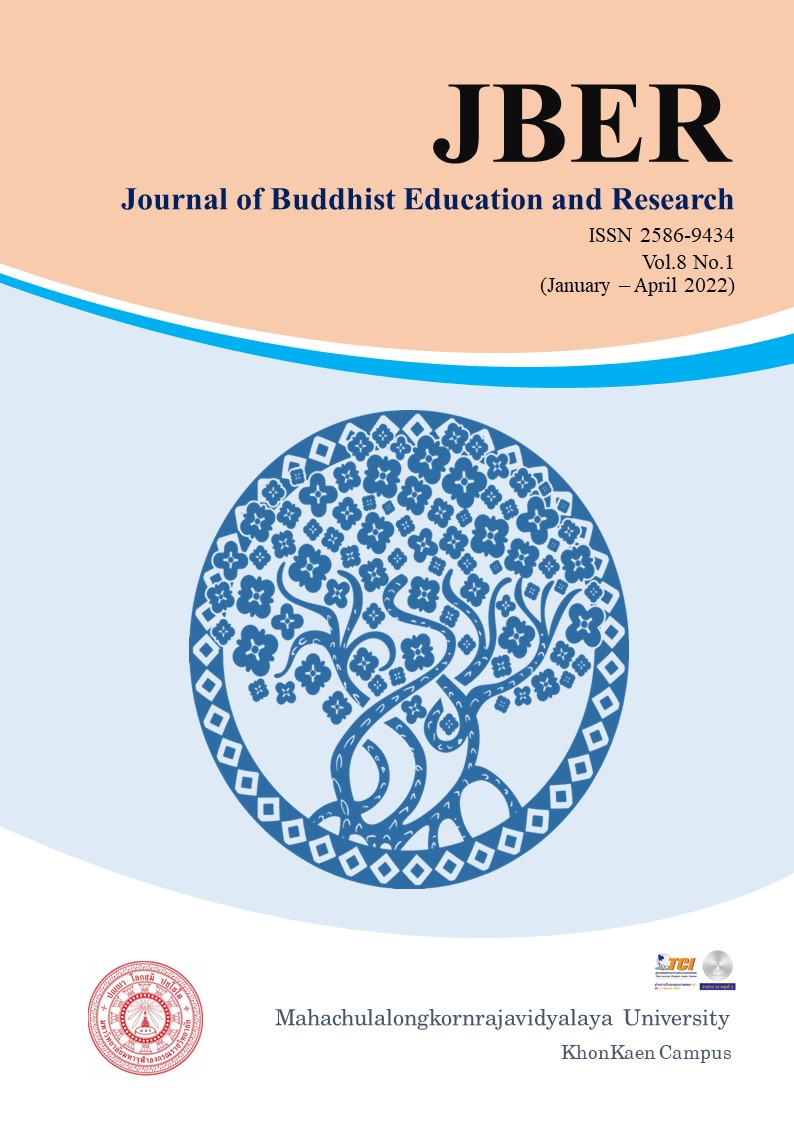LEARNING ACTIVITIES FOR THE DEVELOPMENT OF MENTAL WELL-BEING OF THE ELDERLY USING THREEFOLD TRAINING PRINCIPLE (DTRAISIKKHA) AT SENIOR ASSOCIATION IN THA CHANGE SUB-DISTRICT, PHROMPIRAM DISTRICT, PHITSANULOK PROVINCE
Keywords:
Learning activities; Mental well-being; Elderly; Threefold training principleAbstract
The objective of this research is to develop Learning activities for the development of mental well-being of the elderly using a Buddhist threefold principle for senior association at Tha Chang sub-district, Phrompiram district, Phitsanulok province. This qualitative research composes of 3 phases. Phase 1 was designed to develop learning activities. Phase 2 was an experimentation stage consisting of a series of activities. Phase 3 was activities for the development of the elderly mental well-being. The results of the activities are as follows.
The results from each phase of the research are as follows:
Phase 1: The learning activity development consists of 3 steps: 1) Meeting community leaders, senior association members, and other seniors to present the objectives of the research 2) Interviewing community leaders, and the senior association committee and involving individuals who have basic knowledge about the threefold training principle and mental health problems of the elderly.
Phase 2: The experimentation of the learning activity package consists of 3 bases. The first base was on a canon (basic moral principle) called “Happy 5 canon.” The second base was on concentration, called “Please help me, my friend,” and the third base was on wisdom called “Simulated scenario”.
Phase 3: The development of mental well-being for the elderly. The results of the experiment compose of 4 noticeable improvements, 1) on depression, we found that after the activities conducted by the research, some seniors did not hesitate to have a conversation about various topics, helping them ease this symptom somewhat, 2) on positive emotion, we found that the elderly who joined the activities looked satisfying more about their life and let happiness be a part of their daily life, 3) on good human relation, we found that senior individual was capable to have good human relationships with other people in and out of an organization. They could create a good impression, friendship and saw the positive side and the abilities of other people and 4) on self-control, we found that after the activities, senior members were able to control their temper and embrace the idea that it is natural for them to live with some type of sickness for the rest of their life.
References
จิราพร เกศพิชญวัฒนา และคณะ, (2561), คู่มือเรียนรู้เข้าใจวัยสูงอายุ โครงการพัฒนาคุณภาพชีวิตผู้สูงอายุ ในเขตกรุงเทพมหานคร. กรุงเทพฯ: บริษัท ยืนยงการพิมพ์ จำกัด.
ชมพูนุท พรหมภักดิ์. (2556). การเข้าสู่สังคมผู้สูงอายุของประเทศไทย. สืบค้นเมื่อ 21 มีนาคม 2563. จาก http://library.senate.go.th/document/Ext6078/6078440_0002.PDF.
พระมหาจักรพันธ์ จกฺกวโร. (2563). ไตรสิกขากับการดำเนินชีวิตของชาวพุทธ. สืบค้นเมื่อ 21 มีนาคม 2563. จาก http://www.mcutak.com/default.asp?content=contentdetail&id=27640.
มหาวิทยาลัยมหิดล. (2562). ประเทศไทยกับสังคมผู้สูงอายุ. สืบค้นเมื่อ 21 มีนาคม 2563. จาก https://il.mahidol.ac.th/th/
สุดาวดี ดีอินทร์. (2546). กระบวนการเรียนรู้แบบมีส่วนร่วมในการพัฒนากลุ่มอาชีพ บ้านสูงใต้ ตำบลคูเมือง อําเภอเมืองสรวง จังหวัดร้อยเอ็ด. ปริญญาการศึกษามหาบัณฑิต สาขาวิชาการศึกษานอกระบบ. มหาวิทยาลัยมหาสารคาม.
สุพาภรณ์ กันยะติ๊บ. (2560). หลักพุทธธรรมกับการสร้างเสริมสุขภาพของผู้สูงอายุ : กรณีศึกษา สถานปฏิบัติธรรมแห่งหนึ่ง. ปริญญาสาธารณสุขศาสตรมหาบัณฑิต วิชาเอกการจัดการสร้างเสริมสุขภาพ. มหาวิทยาลัยธรรมศาสตร์.
เสรีชน : เสรีธรรม. (2563). ไตรสิกขา. สืบค้นเมื่อ 21 มีนาคม 2563. จาก http://dhamma.serichon.us/2018/05/09/%E0%B9%84%E0%B8%95%E0%B8%A3%E0%B8%AA%E0%B8%B4%E0%B8%81%E0%B8%82%E0%B8%B2-2/.





